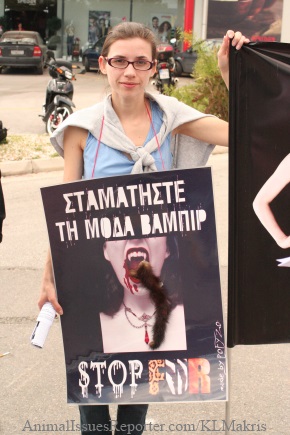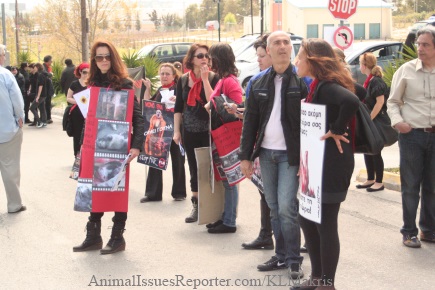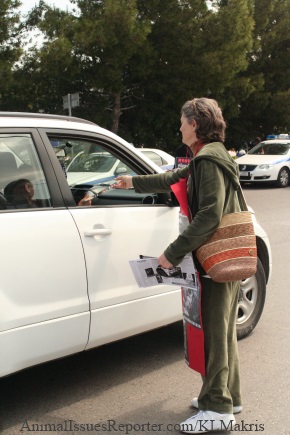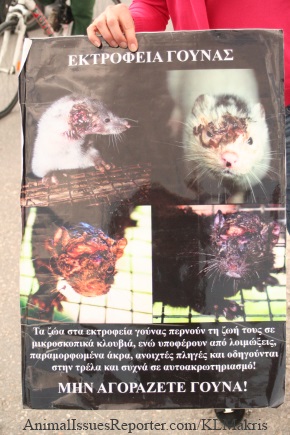Animals killed cruelly ‘for money and vanity,’ say fur fair protestors

Athens Fur Fair protestor. Translation: ‘Stop the Vampire Fashion – Stop Fur.’
Photo: Katerina Lorenzatos Makris
by Katerina Lorenzatos Makris ~
As the fourth annual “Fur Excellence in Athens” International Fur Fair approaches this year on March 27-30, Animal Issues Reporter (AIR) takes a look back at the 2012 event for AIR’s conversations with protestors, police, fair workers and industry insiders in a series of articles on fur.
On one of the first sunny days after the unusually harsh Greek winter of 2012—a breezy March Saturday that many Athenians enjoyed beside the azure Aegean Sea, or under pink blossoming fruit trees in their city’s scenic parks, or strolling among the timeworn marbles of its archaeological sites and museums—there were a hundred or so animal advocates who chose a different activity.
They traveled to a heavily guarded trade exhibit in a northern suburb.
They stood at the edge of the vast parking lot, where police in riot gear instructed them to remain, at least a five-minute walk away from the doors of the EXPO ATHENS exhibit center.
They held signs bearing grisly photos of skinned foxes, minks, and other animals.
They handed out leaflets to passing motorists pleading for an end to a trade that they say makes animals “drip with blood, pain, and tears.”
Protesting an industry that produces what is purportedly Greece’s fourth largest export—fur—they wore black and red.
“The black symbolizes that we are mourning those innocent animals,” explained Mariza Christodoulou, vice president of the Panhellenic Animal Welfare and Environmental Federation, “and the red symbolizes the blood that is shed so cruelly.”

Protestors at Athens Fur Fair say they wear black and red to symbolize the grief they feel for the animals whose blood has been shed.
Photo: Katerina Lorenzatos Makris
Why spend a lovely weekend day on such an unsavory subject?
Demonstrator Rita Charitaki, a Greek Greens Party representative answered, “Animals should not be sacrificed on the altar of fashion.”
‘Animals don’t have to be killed’
Conversations with protest leaders outside the “Fur Excellence in Athens” International Fur Fair yielded several objections to the industry.
“There’s absolutely no reason in the year 2012 to use animals and to make them into fur coats, and to use their skin to make them into something else,” said Olga Kikou, animal rights group coordinator for the Greek Greens Party. “We have so many ways to dress ourselves, very nice materials where animals don’t have to be killed for them.”
Kilkou added that welfare laws are not properly enforced in Greece, allowing animals on fur farms to suffer.
“Greece is in a very bad state economically,” she explained, “and we know that any mechanism that exists, any state mechanism which is used to enforce the law—any kind of law in any area, not just in terms of animal welfare, but anything else—we see problems everywhere and we see problems of enforcement of Greek legislation but also European legislation.”

Demonstrator Rita Charitaki at Athens Fur Fair handing anti-fur leaflets to passing motorists
Photo: Katerina Lorenzatos Makris
“For example,” Kilkou continued, “there are problems of enforcement of the law regarding stray animals. We see them in the streets. So imagine what happens in remote areas where we have no access, where there’s no video. People do not visit there. Imagine what happens inside those farms. We do have videos from two instances in the past couple of years where activists went into those farms and they released some animals, and, indeed, from what we saw in the videos, the conditions were horrendous.”
‘For the money and vanity’
Mariza Christodoulou of the Hellenic Animal Welfare and Environmental Federation elaborated on the videos: “They show cannibalism. They show the animals living in their excrement, on their faces, their bodies covered, all over their own dirt. They show animals going mad, eating one another. They bite the gates in order to get free. The animal lives its entire life in the cage, without being able to perform the basic behaviors of its species. It’s very cruel, very cruel.”
In response to the fur industry argument that if the animals aren’t confined they’ll fight and injure or kill each other anyway, Christodoulou said, “In the wild they wouldn’t be [caged] together like that, so they wouldn’t be fighting. Nature is wild, it is nature. That’s one thing. But it’s another to confine animals and to produce these kinds of behaviors.”
Slaughter of animals on fur farms is “very inhumane,” Christodoulou alleges. “It is Middle Ages torture. They drown them or they put them in a confined place and they die by gas or they break their necks or they do electrocution in their bottoms. All these methods are supposed to be to not spoil the fur and other nonsense.”

Protestor’s sign claims that animals on fur farms suffer from untreated wounds and spend their lives in ‘microscopic’ cages where they go ‘crazy’
Photo: Katerina Lorenzatos Makris
While two of her fellow demonstrators handed fliers to a motorist who had pulled over to offer them words of encouragement, Christodoulou waved a thank-you to him and said, “We are against the fur industry. We are against the cages. Let them free. Let them live. You don’t have to produce a useless product. It’s only for the money and vanity.”
Previous article in AIR’s series on fur: High Sales at Greek Fur Fair
Get fresh AIR! Please click on the SUBSCRIBE button above to receive an email alert when we post new articles on animal issues, including the upcoming ones in our series about the fur industry:
‘Anti-speciesist’ protestors threw paint at Greek fur fair attendees, police alleged
Animals ‘should not be sacrificed on the altar of fashion,’ says fur fair protestor
Fur trade is important to Greek economy, says industry spokesman
Full interview with Mariza Christodoulou, Vice President, Panhellenic Animal Welfare and Environmental Federation and
Killing animals for fur is just as necessary as killing them for food, says industry spokesman
Full interview with Olga Kikou, Coordinator, Animal Rights Group, Greek Green Party
Fur industry will grow despite animal advocates’ efforts to remove ‘freedom of choice,’ spokesman predicts
Interview with Thorbjørn Schiønning, Anima (Danish animal welfare group)
Visit to a fur farm in Denmark
Interview with Ann-Mona Kulsø Larsen, Nordgaard Fur Farm (Denmark)
Interview with Jan Helleskov, Communications Chief, Magasin du Nord (department store in Copenhagen that no longer sells fur)
Interview with Jens Birger Christensen, CO, Birger Christensen (furrier in Copenhagen)
Visit to Kopenhagen Fur
Katerina Lorenzatos Makris is a career journalist, author, and editor. Credits include hundreds of articles for regional wire services and for outlets such as National Geographic Traveler, The San Francisco Chronicle, Travelers’ Tales, NBC’s Petside.com, and Examiner.com (Animal Policy Examiner), a teleplay for CBS-TV, a short story for The Bark magazine, and 17 novels for Avon, E.P. Dutton, Simon and Schuster, and other major publishers.
Together with coauthor Shelley Frost, Katerina wrote a step-by-step guide for hands-on, in-the-trenches dog rescue, Your Adopted Dog: Everything You Need to Know About Rescuing and Caring for a Best Friend in Need (The Lyons Press).
Please respect copyright law. Sharing AIR links really helps! But copying more than a couple of paragraphs of content without permission is a no-no. If you’d like to use one of AIR’s articles or one of our photographs, kindly contact us at [airinfo AT yahoo DOT com].
Copyright © 2014 Animal Issues Reporter and AnimalIssuesReporter.com.
All rights reserved.
Leave a Reply